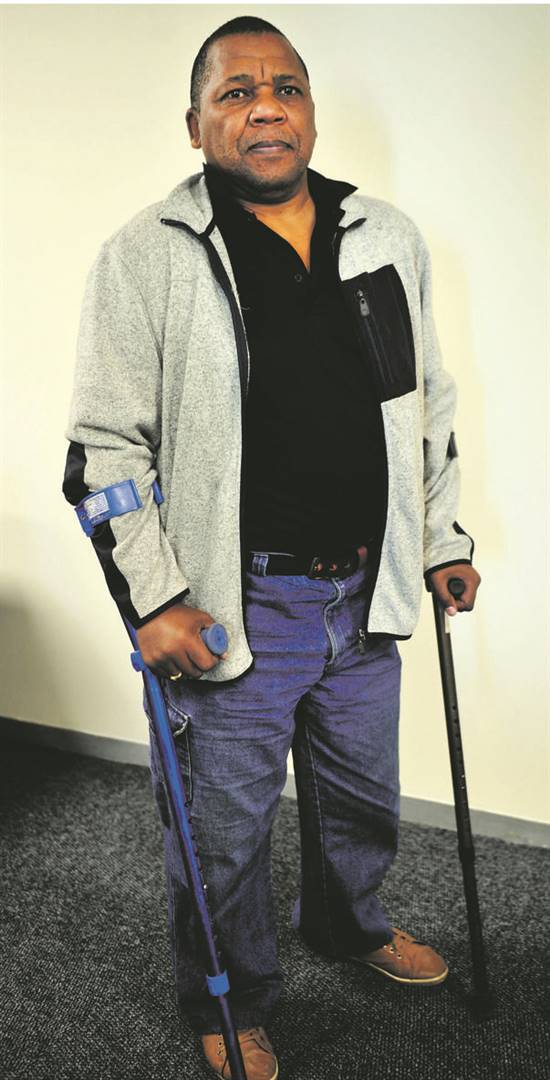
You may think you are safeguarding your and your family’s financial future by taking out a life insurance policy, but insurance policy fine print can decree otherwise, as Gay Khaile discovered
When Gay Khaile took out a life insurance policy 10 years ago, he thought he was safeguarding his and his family’s future financial security should anything happen to him.
But the opposite has turned out to be true.
Khaile (60) has been embroiled in a dispute with his insurer, Discovery Life, for more than a year.
Last year, the Johannesburg-based man took early retirement from his job at the labour department due to ill health and tried claiming from his insurance – but the claim that he thought would secure part of his future was declined.
Having suffered and survived polio – a contagious viral illness that leads to muscle weakness, trouble moving and, in its most severe form, leads to paralysis or even death – as a little boy, Khaile grew up with a disabled left leg that left him with a noticeable limp.
He was also diagnosed with post-polio syndrome in 2012.
This is a condition that, according to the National Institute of Neurological Disorders and Stroke, affects polio survivors years after recovery and causes progressive muscle weakness, fatigue and joint pain, among other health problems.
Khaile’s condition became progressively worse, which led him to take early retirement in February last year.
When he took out the Discovery Life policy in 2009, he fully disclosed his disability to the consultant who initially processed the policy, he told City Press.
However, to his surprise, he was told that his former illness and any consequences thereof were in fact excluded from what he could claim benefits from.
“Why would I have effectively signed my own death warrant? I can state categorically and unequivocally that I would not have taken the policy had I been correctly advised that, because of my physical disability, a future claim would be declined if my permanent disability was related to polio,” Khaile says.
“It does not make sense that I would have continued with the policy knowing such a clause existed against me.”
The matter went before the Ombudsman for Long-Term Insurance and a ruling was made in favour of Discovery’s decision.
City Press has seen documents showing his initial agreement – provided by Discovery to the ombudsman – that show the exclusion clauses in the policy, which also detail poliomyelitis as an exclusion.
But Khaile is still accusing the insurer of unethical and “unfair discriminatory” practices that went against the Constitution of the country’s principles of equality, saying the initial exclusion against his pre-existing condition should not have been in place in the first place, and that he was effectively being “punished for his disability”.
However, Discovery sees it differently.
Sylvia Steyn, head of servicing and claims at Discovery Life, this week told City Press: “Life insurance is risk-rated cover and the fundamental principle of underwriting is to determine the level of risk. Exclusions are in place to give clients cover for other life events that they would otherwise not have access to because they would be declined cover.
“All insurance companies apply similar risk assessment techniques. Discovery Life offers policies for disability cover and all of our policies are open to people with disabilities.”
The insurance company said that it paid 97% of the claims made against it, totalling R3 billion a year, and had one of the industry’s highest rates of claims being paid.
It added that a risk assessment (“underwriting”) of each applicant for life insurance was specifically allowed for and was “not discriminatory”, but a core part of the life insurance application process.
“In the case at hand, the client specifically accepted that he would not be covered for claims in respect of his existing condition at the time of applying for insurance, but, importantly, would still be covered for other severe illnesses and disabilities.
“This is a transparent process and any exclusions are clearly communicated to [and accepted in writing by] the client,” Steyn asserted.
But Khaile still disputes this and maintains that this was not communicated to him by the consultant.
He had also tried to get in contact with the consultant, to no avail.
Because the consultant who assisted him with the policy was initially an independent intermediary, he was advised to seek a remedy through the office of the Ombudsman for Financial Service Providers.
However, the insurance company maintained that, “under the circumstances, it isn’t discriminatory to not pay claims in respect of a condition that was specifically excluded, because the applicant applied for the cover with the pre-existing condition”.
“On the contrary, it would be unsustainable for life insurers to provide cover for serious conditions that applicants may have at the time of applying for their cover. In the extreme, this would result in people only applying for life insurance when they are sick, which would obviously not be viable.”
Steyn added: “Mr Khaile’s comments with regard to his constitutional right to equality being infringed are incorrect. Our business practices and Life Plan contract adhere not only to the prescripts of the Constitution, but also to its spirit.”
Khaile, who says he had paid up to R2 700 in premiums monthly for years to prevent future financial strain should “anything happen to him”, says that this is exactly what has been the case for him since his retirement.
“That money from the claim would have gone to reduce my bond repayment and helped with school fees for my children. When the insurers sell us these things, they speak in their lingo. Why would I sign something that invalidated my rights? As it stands, I am behind in my bond repayment.
“I can’t afford medical aid, but I am in constant pain and I have to take 12 pills a day for that. How many more people are out there who are unaware of this and who might be going through the same experience as myself?”
TALK TO US
Should Discovery Life do more to make sure its clients understand the terms and conditions of their life insurance policies?
SMS us on 35697 using the keyword INSURANCE and tell us what you think. Please include your name and province. SMSes cost R1.50. By participating, you agree to receive occasional marketing material
 |
| ||||||||||||
| |||||||||||||




 Publications
Publications
 Partners
Partners









